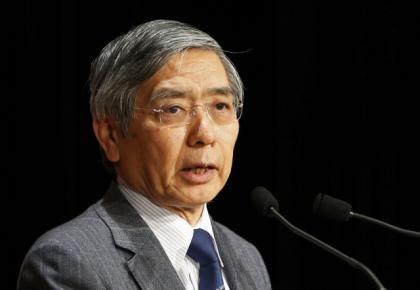Japan Firms See BOJ Fall Short of Price Goal 5 Years Ahead-S
Bareksa • 02 Jul 2014

Bank of Japan Governor Haruhiko Kuroda speaks during a seminar in Tokyo (REUTERS/Yuya Shino)
The BOJ expects consumer inflation to slow to levels just above 1 percent in coming months as the effect of higher impor
Bareksa.com - Japanese companies expect consumer inflation to fall short of the central bank's 2 percent target for the next five years, emphasizing the challenge it faces in trying to drive up inflation expectations through aggressive monetary stimulus.
Firms polled by the Bank of Japan, as part of a detailed "tankan" survey for June, said they expect consumer prices to rise an average 1.5 percent a year from now, unchanged from projections made three months ago.
The outcome casts doubt on the BOJ's argument that it can achieve its 2 percent price goal sometime next year as improvements in the economy heighten inflation expectations - encouraging firms and households to spend more sooner rather than later.
"Companies feel that while Japan is no longer in deflation, it is in a state of mild dis-inflation," said Hideo Kumano, chief economist at Dai-ichi Life Research Institute.(Disinflation is a slowing in the pace of price rises, while deflation is a sustained fall in prices.)
Under its "quantitative and qualitative easing" (QQE) enacted in April last year, the BOJ pledged to accelerate consumer inflation to 2 percent in roughly two years via aggressive asset purchases to end 15 years of mild deflation.
BOJ Governor Haruhiko Kuroda has repeatedly expressed his confidence that Japan is on track to meet the price target, despite the doubts of many private-sector analysts that inflation will accelerate so quickly.
Core consumer inflation stood at 1.4 percent in the year to May, excluding the effect of a sales tax hike in April, half-way through the central bank's price target period.
Firms in the tankan survey projected consumer prices to rise an annual 1.6 percent three years from now, down 0.1 percentage point from the previous survey in March, and 1.7 percent five years from now, unchanged from three months ago, the survey showed on Wednesday.
The BOJ expects consumer inflation to slow to levels just above 1 percent in coming months as the effect of higher import costs from the weak yen fades. Then it sees inflation accelerating again toward 2 percent as rising wages and inflation expectations underpin household spending - allowing firms to increase their prices.
A closer look at the survey, however, shows corporate inflation expectations have barely risen. Nearly half of the firms polled expect prices to rise 1 percent or less a year from now, while 16 percent say they do not have a clear image on how prices will perform ahead due to uncertainty over the outlook.
"Companies' price outlook continues to undershoot the BOJ's 2 percent price target. There is absolutely no sign inflation expectations are heightening," said Yasunari Ueno, chief market economist at Mizuho Securities.
The tankan alone, however, is unlikely to prompt the BOJ into cutting its optimistic inflation forecasts or consider expanding monetary stimulus any time soon, analysts said.
In its latest projections issued in April, the BOJ expects core consumer inflation to accelerate to 1.9 percent in the next fiscal year beginning in April 2015 from 1.3 percent in the current business year.
The central bank is likely to roughly maintain the forecasts in a quarterly review of the estimates, to be conducted at its next monetary policy review July 14-15, analysts said.
The BOJ started the survey from the previous tankan in March to gather more information on inflation expectations, key to its current stimulus programme. Japan lacks a credible benchmark for inflation expectations because its market for inflation-linked bonds remains small.
The data on corporate inflation expectations, from a survey of over 10,000 firms, comes one day after a summary of the tankan showed that business sentiment worsened in the three months to June due to the impact of April's increase in sales tax to 8 percent from 5 percent. (Source : Reuters)